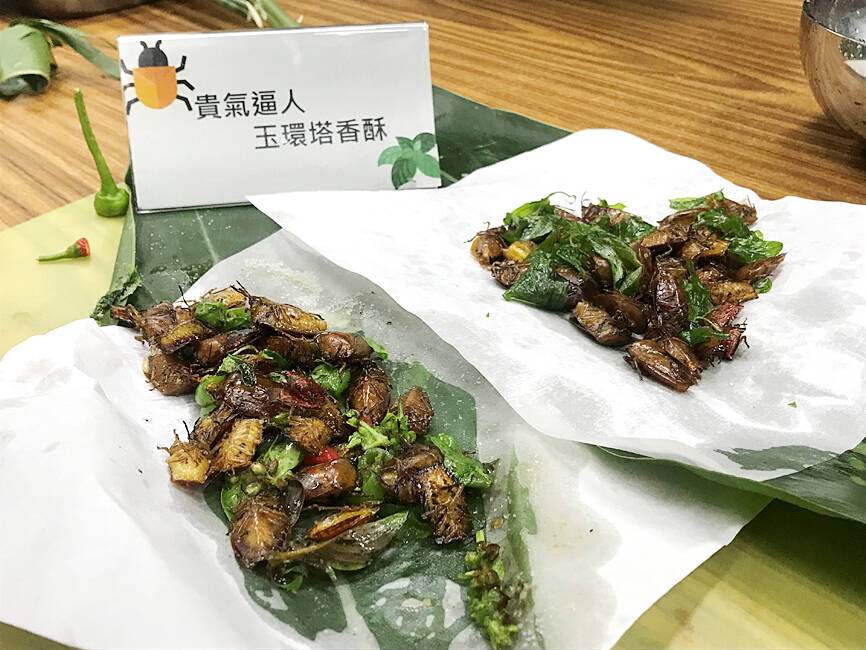After years of trying to control the invasive lychee giant stink bug population by spraying and offering bounties, the Forestry and Nature Conservation Agency on Tuesday encouraged people to join its efforts to eradicate the insect by learning how to cook and eat them.
Lychee giant stink bugs, which were first spotted on Taiwan’s main island in 2009, are commonly found during the summer on trees belonging to the soapberry family, including longans, lychees, flamegold rain trees and wingleaf soapberries.
As a defense mechanism, the bugs release a corrosive, stinky liquid that can burn through leaves and fruit, which has in the past few years become an increasing problem for Taiwan’s longan and lychee farmers.

Photo courtesy of the Forestry and Natural Conservation Agency’s Chiayi branch
To control them, local governments have tried, with varying degrees of success, using drones to spray orchards with saponins — bitter, plant-derived organic chemicals — and offering bounties for the insect’s eggs.
However, since lychee giant stink bugs are edible and a good source of protein, people can also help “eradicate [the insects] by eating them,” Lee Ting-chung (李定忠), deputy head of the agency’s Chiayi branch office, said on Tuesday.
To help promote the stink bugs as a food source, Lee said his office would hold classes at Chiayi’s Chukou Nature Center on April 27 and May 11.
Attendees would learn how to identify and remove lychee giant stink bugs and how to cook them — as well as several other common insects — using a handful of easy recipes, he said.
Although eating insects is not common in Taiwan, it is part of the food cultures of hundreds of millions of people around the world, Lee said.
Lychee giant stink bugs, in particular, are eaten across parts of Southeast Asia and China, he said.
More information on the classes and how to register is available on the Chukou Nature Center’s Facebook page.

Taipei has once again made it to the top 100 in Oxford Economics’ Global Cities Index 2025 report, moving up five places from last year to 60. The annual index, which was published last month, evaluated 1,000 of the most populated metropolises based on five indices — economics, human capital, quality of life, environment and governance. New York maintained its top spot this year, placing first in the economics index thanks to the strength of its vibrant financial industry and economic stability. Taipei ranked 263rd in economics, 44th in human capital, 15th in quality of life, 284th for environment and 75th in governance,

The Sports Administration yesterday demanded an apology from the national table tennis association for barring 17-year-old Yeh Yi-tian (葉伊恬) from competing in the upcoming World Table Tennis (WTT) United States Smash tournament in Las Vegas this July. The sports agency said in a statement that the Chinese Taipei Table Tennis Association (CTTTA) must explain to the public why it withdrew Yeh from the WTT tournament in Las Vegas. The sports agency said it contacted the association to express its disapproval of the decision-making process after receiving a complaint from Yeh’s coach, Chuang

Control Yuan Secretary-General Lee Chun-yi (李俊俋) tendered his resignation last night, admitting that he had misused a government vehicle, as reported by media. His resignation was immediately accepted by the Control Yuan. In a statement explaining why he had resigned, Lee apologized for using a Control Yuan vehicle to transport his dog to a pet grooming salon on May 20. The issue first came to light late last month, when TVBS News reported that Lee had instructed his driver to take the dog to the salon. The news channel broadcast photos that it said were taken by an unnamed whistle-blower, which purportedly showed the

A former officer in China’s People’s Liberation Army (PLA) who witnessed the aftermath of the 1989 Tiananmen Square massacre has warned that Taiwan could face a similar fate if China attempts to unify the country by force. Li Xiaoming (李曉明), who was deployed to Beijing as a junior officer during the crackdown, said Taiwanese people should study the massacre carefully, because it offers a glimpse of what Beijing is willing to do to suppress dissent. “What happened in Tiananmen Square could happen in Taiwan too,” Li told CNA in a May 22 interview, ahead of the massacre’s 36th anniversary. “If Taiwanese students or